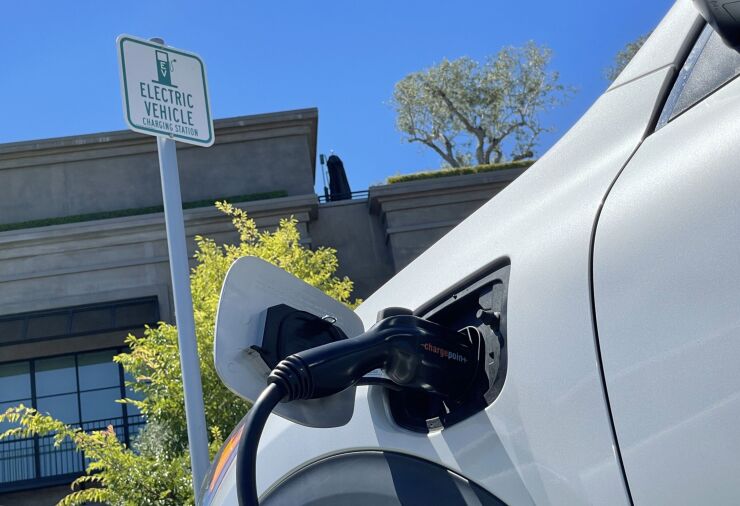President Joe Biden's signature economic legislation promised to create a wave of demand for made-in-America electric vehicles by offering lucrative tax credits. A year later, EV uptake is more of a wavelet as U.S. car buyers and automakers grapple with qualifications that have limited eligibility for many current electrified models.
The bar for full credits will soon get higher as the U.S. sets new rules aimed at curbing foreign battery sourcing and manufacturing. Automakers, who already are seeing
"It's supposed to wean America's dependence on China for EV components and raw materials," John Bozzella, president of major auto lobbyist Alliance for Automotive Innovation, said in a blog post Wednesday, "but the pace of those requirements are unevenly applied and means fewer EVs (and consumers) actually qualify."
Currently, 18 of the 97 electrified vehicles on sale in the U.S. qualify for some or all of the tax credit under the Inflation Reduction Act. That number has decreased as the U.S. began imposing the new restrictions.
The IRA extends as much as $7,500 in consumer tax breaks for cars that meet criteria on how much they cost, how much their buyers earn and where the vehicles are assembled. The most detailed, and controversial, requirements are focused on where automakers can source critical components like minerals within the battery.

Specifically, the rules split the credit in two, with $3,750 available for vehicles with at least half of their battery components from North America, and the remainder if 40% of the value of raw materials in the battery are extracted or processed domestically, or in countries with U.S. free-trade agreements. Those requirements will ramp up over time.
These incentives coincided with a significant increase in electric-vehicle adoption last year. EVs make up less than 1% of the 250 million cars, SUVs, and light-duty trucks on U.S. roads,
Genevieve Cullen, president of the Washington trade association the Electric Drive Transportation Association, which lobbies for EV-friendly policies, said in a statement marking the anniversary of the IRA that the law represents "unprecedented federal investments" that "have already spurred critical development across the country."
Despite some
Andrew Starling, dealer principal at Orlando-based Starling Automotive Group, which owns Chevrolet dealerships in Florida and South Carolina, said the IRA has "clearly accelerated growth of the EV market," even with the more complicated tax credit rules. His stores are selling more EVs in 2023 than they did in 2022, he said.
"I'm sure folks will fight over who gets the credit, but at least at the entry level, $7,500 is enough to make EVs competitive with their ICE counterparts," he said, referring to internal-combustion engine vehicles, which are much cheaper.
Still, the changes have generated some customer confusion. Vince Sheehy, president and CEO of Sheehy Auto Stores, which operates 30 dealerships in the region between Baltimore and Richmond, said the IRA has complicated the sales prices for EVs that he was already having trouble convincing customers to buy.
"Once you got through that initial group who wanted EVs and they were not price-sensitive, we're into a group that is looking at the value proposition," he said. "You really can't get an all-wheel drive EV under $50,000, so it's just not competitive with the other choices out there in the market to people who are super-sensitive to monthly payments."
He predicted EV sales would eventually pick up at his dealerships and others, but he said, "We're all going to have to start figuring out at what price point."
The average sales price of an electric car fell to $53,469 in July 2023, down from $53,682 in June as carmakers like Tesla Inc. and Ford Motor Co. slashed prices.
Keeping this pace may require more maneuvering from automakers, which have adjusted to meet the U.S. Treasury Department's initial sourcing and manufacturing restrictions, but may fall behind as rules change.
The Treasury has been vague about defining what it calls foreign entities of concern, although administration officials have said it includes Chinese companies. No tax breaks are available for vehicles containing battery components or critical minerals from foreign entities of concern starting in 2024 and 2025, respectively.
"Companies have been able to shift supply chains, adapt supply chains, invest in domestic manufacturing enough this year to qualify for the full credit," said Albert Gore, executive director of the Zero Emission Transportation Association trade group, which represents EV makers like Tesla and Rivian Automotive Inc.
"It will get more challenging as additional criteria is added," he said, adding that changes to the eligibility status of particular models could only be temporary.
An EV dropping from a full credit to a half credit "may just be a time when they are scaling up production of parts or minerals that are taking time to build in the U.S.," Gore said.





